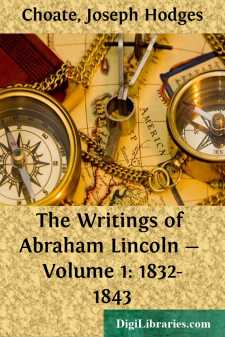Categories
- Antiques & Collectibles 13
- Architecture 36
- Art 48
- Bibles 22
- Biography & Autobiography 813
- Body, Mind & Spirit 142
- Business & Economics 28
- Children's Books 15
- Children's Fiction 12
- Computers 4
- Cooking 94
- Crafts & Hobbies 4
- Drama 346
- Education 46
- Family & Relationships 57
- Fiction 11828
- Games 19
- Gardening 17
- Health & Fitness 34
- History 1377
- House & Home 1
- Humor 147
- Juvenile Fiction 1873
- Juvenile Nonfiction 202
- Language Arts & Disciplines 88
- Law 16
- Literary Collections 686
- Literary Criticism 179
- Mathematics 13
- Medical 41
- Music 40
- Nature 179
- Non-Classifiable 1768
- Performing Arts 7
- Periodicals 1453
- Philosophy 64
- Photography 2
- Poetry 896
- Political Science 203
- Psychology 42
- Reference 154
- Religion 513
- Science 126
- Self-Help 84
- Social Science 81
- Sports & Recreation 34
- Study Aids 3
- Technology & Engineering 59
- Transportation 23
- Travel 463
- True Crime 29
Joseph Hodges Choate
Joseph Hodges Choate (1832–1917) was an American lawyer, diplomat, and public speaker known for his sharp legal mind and eloquence. He served as the U.S. Ambassador to the United Kingdom from 1899 to 1905, where he strengthened diplomatic relations between the two nations. As a lawyer, Choate successfully argued several high-profile cases before the U.S. Supreme Court, including the landmark case against the income tax in "Pollock v. Farmers' Loan & Trust Co." He was also a key figure in the establishment of the Metropolitan Museum of Art and an advocate for civic and legal reform.
Author's Books:
Sort by:
INTRODUCTORY Immediately after Lincoln's re-election to the Presidency, in an off-hand speech, delivered in response to a serenade by some of his admirers on the evening of November 10, 1864, he spoke as follows: "It has long been a grave question whether any government not too strong for the liberties of its people can be strong enough to maintain its existence in great emergencies. On this...
more...
Dear H. Your letter has found me in the midst of work quite unconnected with this hideous war in which for the last eighteen months we in England have lived and moved and had our being. My literary profession, indeed, has been to me, as to others, since August 4th, 1914, something to be interposed for a short time, day by day, between a mind tormented and obsessed by the spectacle of war and the...
more...



